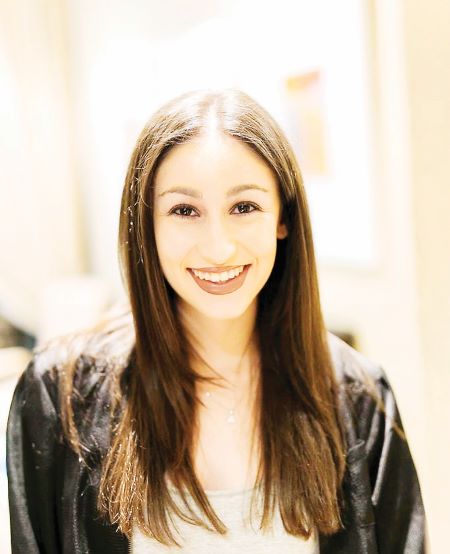click to dowload our latest edition
CLICK HERE TO SUBSCRIBE TO OUR NEWSLETTER


Published
4 years agoon
By
adminGILLIAN KLAWANSKY
“There’s very little integration with students from other cultures,” says Kayla Ginsberg, a student at the University of the Witwatersrand (Wits), and the national director of the South African Union of Jewish Students (SAUJS). “It’s dangerous as it has an impact on how we’re perceived.”
“I’ve been working on building coalitions between SAUJS and other student groups, and nobody wants to join up with us,” she says. “They say, ‘You’re so exclusive. You don’t get involved in student affairs.’ It’s a stigma we’re working hard to erase.” Their efforts have finally been successful, with SAUJS recently teaming up with the Wits Student Representative Council (SRC) for the first time in 40 years.
“It’s going to change the dynamics for Jews on campus in coming years,” says Ginsberg. “It came about as a result of the repeated personal efforts of Jewish students befriending and talking to different groups. Not many people are willing to do that, but when they do, it has great impact.”
In her fifth year at Wits studying towards an LLB degree, Ginsberg, a Hirsch Lyons alumnus, admits that she, too, stuck with her Jewish friends when she started university. “I don’t think we realise we’re doing it because we grow up in such a bubble.”
Ginsberg says that while those who come from single-sex religious schools like she did experience an even greater culture shock than King David students, everyone is affected in some way.
Having attended King David Linksfield from Grades 1 to 12, Kayla Borowitz is in her third year of BA Law at Wits. She says mixing with other communities has been an enriching experience. Although university was a culture shock because she was accustomed to being around Jewish people, the change was positive. “I experienced the buzzing multiracial and multicultural student life I’d always heard about,” she says. Borowitz loves the feeling of really being a part of South African society. She’s also improved her connection to the country by studying law.
She understands why Jewish students tend to remain in their homogenous comfort zones, but disagrees with this strategy. “It’s limiting to associate only with people similar to you as it won’t be possible to do this in the ‘real world’ or at work. Integrating with people from different walks of life also broadens your horizons. I feel like I’ve broken out of the Jewish bubble, and would encourage other Jewish students to do the same. Ironically, mixing with other people strengthens your sense of community. Conversations inevitably arise about your background, so I’m constantly reminded of my Jewishness.”
Borowitz also stresses the value of starting afresh at university. “People aren’t concerned about what might have mattered at school. Becoming friendly with people from different backgrounds has also given me the perspective that diversity is a beautiful, powerful thing. Though religion and race are often hotspots for conflict, our differences make the world much more interesting.”
Suddenly becoming a minority can be difficult for Jewish students. While most say they haven’t experienced blatant anti-Semitism, they all acknowledge the anti-Israel rhetoric they face, especially during Israel Apartheid Week.
“BDS [the Boycott, Divestment, Sanctions moment] was born in South Africa and the apartheid argument is an emotional one, so it’s successful on South African campuses,” says Ginsberg. “Israel Apartheid Week is hell for Jewish Students – often descending into anti-Semitism. But it’s better than it was, largely because of SAUJS’ hard work. That being said, BDS is a massive issue, anti-Semitism isn’t. I wear my magen david proudly, and I’ve never been scared to do it on campus.”
Grant Norrie, an engineering student at the University of Cape Town (UCT) says he’s stuck with his Jewish friends from Herzlia mainly because they’re all doing the same degree. The chairperson of SAUJS Western Cape, Norrie argues that this is the exception rather than the rule at UCT. “Jewish people here actually try to move out of the community, and their best friends at UCT generally aren’t Jewish.”
In some of his classes, Norrie has worked with people of different cultures, and recently partnered with a Muslim group of students. “They knew about Shabbat – one of the few things that came up when we discussed religion,” he says. “But our focus was always on getting the work done, religious issues were a side note. There was no tension.”
Yanir Grindler, a former Wits student doing his Masters in clinical psychology at the University of Johannesburg, has struggled to find his place within and without the Jewish community. “After school, I felt suffocated by the community, it was a bit too insular for my liking,” he recalls. Upon matriculating from King David Victory Park in 2010, Grindler made aliyah, but returned five years later, enrolling in Wits. Here, he embraced the opportunities for integration.
“I chose to spend more time on campus, getting involved in extramural activities like student politics and connecting with students outside of the Jewish community. I’ve always tried to push myself outside my comfort zone. I don’t think enough young Jews do that, they’re generally quite mollycoddled.
“I keep Shabbat, and think of myself as a pretty observant Jew, but I try to balance that with being South African.”
Befriending people beyond the Jewish community has given Grindler a more holistic perspective. “As Jews, we live sheltered lives, we don’t properly engage with the complexities and challenges of the majority of South Africans. Integrating gave me the opportunity to see the challenges, understand the real hardships, and appreciate what I have.”
